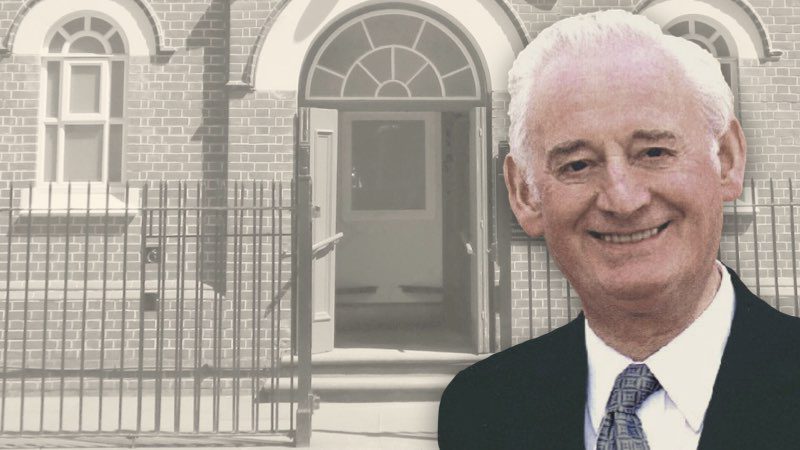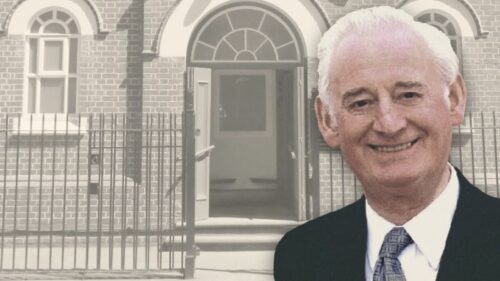
The Everlasting Gospel
[Posted by permission. Bethel Strict Baptist Chapel.]
Sermon preached at Bethel Chapel, Luton, by Mr. B. A. Ramsbottom, on Lord’s day evening, 14th October, 2018
“The everlasting gospel”—Revelation 14:6
These are three extremely well-known words. They have become almost part of our spiritual vocabulary, and often in prayer or in preaching or in conversation when the gospel is referred to, it is referred to as “the everlasting gospel.”
Now this is a strange place to find these beautiful words, Revelation chapter 14. Mind you, there are some very beautiful things concerning Christ in this chapter, but really the theme is the downfall of Babylon, signifying all the power and influence of the world which lieth in the wicked one. Mysteriously, we are told that it was an angel here having “the everlasting gospel” to preach. How often have you heard from our pulpits and our ministers that God never sent angels to preach, that He sent sinners saved by grace? Some have thought that by the angel here what is meant is on the lines of one of the angels of the seven churches, because there the angels are the ministers, the pastors of the seven churches. I rather tend to think the point here is that all these three angels, one after another, this being the first one, they declared the fall of Babylon. So this is in a different sense to the usual preaching of the gospel. It is a declaration, if you will, of the triumph of the gospel in the overthrow of all those that oppose, even the mightiest power on earth.
Now I do not need to tell you, this is a vital subject. It is a really important subject. It means everything to living souls – the glorious gospel of the grace of God. I think even you young ones know what the gospel means. It means the good news of salvation, ordained in eternity past in God’s covenant of grace, made known in the Word of God, gloriously revealed in the Person and finished work of our Lord Jesus, applied by the Holy Spirit.
“The gospel of the grace of God.” With the Lord’s help this evening, I want to try to speak to you on this point. We know what the gospel is. We know its value, its preciousness. Some of you have sweetly experienced it. But I just want to deal with this one point: why the Lord calls it “the everlasting gospel.” Now there are a few reasons for it, and the first is this: that it is from the beginning right to the end, from before the foundation of the world, even to its consummation in heaven. It is “from everlasting to everlasting.” The sweet plan of salvation before man was created, as man was seen lost and ruined in the Fall, the whole plan of salvation had the gospel before it. You could not strictly say that the plan of salvation was the gospel, but apart from the plan of salvation, there would not be any gospel to preach.
Then you see, from everlasting, when man was created. What do you make of that unusual word, that the Lamb of God was “slain from the foundation of the world”? Well, you all know that He was slain on the cross. He was “slain from the foundation of the world.” It is “the ever- lasting gospel.” It goes before time, and right at the beginning of time, the first promise to Adam in his fallen state, the promise that the seed of the woman should bruise the serpent’s head, and then soon afterwards Abel. You see the gospel in Abel when he brought that slain lamb, the “more excellent sacrifice than Cain.” You can trace it right through the Old Testament – “the everlasting gospel” – all the types and shadows, the daily sacrifice, the shedding of blood. You can see it in some of the beautiful prophecies, not least Isaiah 53. People call it the gospel of Isaiah. “He was wounded for our transgressions, He was bruised for our iniquities: the chastisement of our peace was upon Him; and with His stripes we are healed.” The many promises there are of gospel days, the prophecies that look forward to gospel days.
Then of course, in the coming of the Saviour, you see the gospel in all its fulness in the Saviour’s finished work, His death, resurrection and ascension. Really, when you come to the Acts of the Apostles, it is full of the gospel. When you come to the Epistles, they are full of the gospel. And when you come to the Revelation, it is full of the gospel.
“The everlasting gospel.” It is this: it is truth unchanged, unchanging. If you think of it, sometimes or quite often, in my study, I pick up a book to read that was written in the 1600s. Sometimes the book is not just a modern version of the 1600s; it is the very text of a book which was printed before the Great Plague and before the Great Fire in the 1600s. Well, no-one apart from those interested in history would read a book that was written nearly four hundred years ago! People would say all those books are out of date now; things have changed; there are fresh views. The gospel is “the everlasting gospel,” and in its revelation it knows no change from age to age.
Never forget this: all the attempts that have been made to destroy the gospel and the witness of the gospel – many in our own land who were cruelly persecuted, and many of the first Bibles were burned on a big bonfire, but it is “the everlasting gospel,” and it can never be destroyed. How long this world will last, we do not know, but to the very end of time, the gospel will be preached, till the last vessel of mercy is called by grace and prepared for glory. But it will still be the gospel being preached and having a gracious effect, and it will be the effect of the gospel to all eternity in heaven. So it is no wonder that the gospel of the grace of God is called “the everlasting gospel.”
“It speaks of pardon, full and free,
Through Christ, the Lamb once slain.”
“The everlasting gospel.” Aren’t some of you grateful that we still have it, that those attempts of sin and Satan to overthrow it were not successful? Where would we be this evening in our unworthiness and sin and need, and eternity before us, if we had not got the gospel to reveal the way of salvation to us?
“The everlasting gospel.” Now the second reason why I believe it is called “the everlasting gospel,” is very simply because it speaks of so many things that are everlasting, and I am sure those of you who love and fear the Lord, your thoughts are going in front of me, and you are thinking of some of them.
Everlasting love. What a revelation, that God has loved poor, guilty sinners with an everlasting love! “The Lord hath appeared of old unto me, saying, Yea, I have loved thee with an everlasting love: therefore with lovingkindness have I drawn thee.” Everlasting love. It knew no beginning; it can never end.
Everlasting righteousness. We have none of our own, but a precious righteousness has been provided in the work of our Lord Jesus, fulfilling the law on our behalf and then imputing it to us. It is that glorious robe, the robe of Christ’s righteousness, and it is everlasting. Sinner,
“No age can change its glorious hue;
The robe of Christ is ever new.”
And then everlasting salvation. O we do need it! Where would we be without it! “Saved in the Lord” – and it is saved by grace, in Christ alone, by faith alone – “saved in the Lord with an everlasting salvation.”
Then we read of something which in a sense is the foundation of all these blessed everlastings: the everlasting priesthood. O that is our dear Lord and Saviour Jesus Christ going to the cross, laying down His life a sacrifice. “This Man, because He continueth ever, hath an unchangeable priesthood” – the foundation of our hope, the precious blood He shed, the way of access to His Father, the way of acceptance, the way to heaven. O, “This Man, because He continueth ever, hath an unchangeable priesthood. Wherefore” – this is it! – “He is able also to save them to the uttermost that come unto God by Him.”
“The everlasting gospel.” Of course, the one that is spoken of more than any other: everlasting life. But perhaps this is going to shake you. It was the Lord Jesus who more than any spoke of everlasting life, and when He did, invariably He spoke of everlasting death, and He spoke of everlasting destruction and everlasting condemnation. Now there is a line of separation here, and it runs in the teaching of our Lord and Saviour more than anyone else. You girls and boys, you young ones, beware of all this teaching that is about in the world today, that God is loving everybody and God is the Father of everybody, and everybody is going to heaven. There is that solemn line of demarcation. Eternal life is only to be found in one place, and that is in Christ, and it is normally found by those who have felt the awfulness of eternal death. Pray to be delivered from that. Flee from it.
But you know the scriptures. Just to quote one: “As Moses lifted up the serpent in the wilderness, even so must the Son of man be lifted up: that whosoever believeth in Him should not perish, but have eternal life. For God so loved the world, that He gave His only begotten Son, that whosoever believeth in Him should not perish, but have everlasting life.” I think as you read the Scriptures, you will find that two things are always joined together: eternal life and the knowledge of Christ – not just knowing about Him; knowing Him personally and savingly. And usually in each case, this important point of being a believer. “Whosoever believeth in Him.”
“Upon a life I did not live,
Upon a death I did not die,
Another’s life, Another’s death,
I rest my whole eternity.”
That is the sinner who truly believes, and that is the sinner who has everlasting life.
There is so much here, but I do not want to weary you with all these things. But there is “an everlasting covenant, ordered in all things, and sure.” O didn’t I find that anchor ground, that rock foundation, in my early days: “Although my house be not so with God” – everything wrong without and within and in front – “yet He hath made with me” – even a sinner like me – “an everlasting covenant, ordered in all things, and sure.”
We read also of everlasting consolation, and that will be precious to those of you in sadness this evening, whether it is spiritual, or whether it is providential – the compassion of our Lord Jesus, His loving sympathy. He knows; He understands; He cares. “Everlasting consolation and good hope through grace.” So there are a lot of precious everlastings.
“The everlasting gospel.” Now I want to pass on to these things in the gospel, preached in the gospel, loved in the gospel. These are ever- lasting things. They are not things which might be true one day and not the next. They are not uncertainties. It is “Jesus Christ the same yesterday, and to day, and for ever.” There is something everlasting there, in the Person of the Saviour Himself, that rock foundation. “Upon this rock I will build My church.” It is an everlasting foundation.
The point on my mind at present is this, if you can receive it: everything in this dying, changing world is passing away – things that can be shaken. And then we read of those things that can never be shaken which shall remain, because they are not temporary. They are not just for a day or a night. They are not something you have one day and you lose them. They are these solid, substantial, unchangeable truths, where led by the Spirit of God, seeing change and decay all around you, and seeing worse within you, “Lead me to the rock that is higher than I.”
These everlasting things – to rest on them, to have our souls bound up in them, to know that the sinner’s union with Christ is an everlasting union that can never be broken! No wonder John Kent bursts out: “Hail, sacred union, firm and strong!” Wonderful truth, that, the union between Christ and His poor, unworthy people, in bonds of grace! It is an everlasting union. It can never be destroyed. It can never be broken. If your religion is real, you will find these gospel truths so attractive, because they are dependable things. They are not things that will let you down. They are not things that will let you go. “The everlasting gospel.” It is no wonder the hymnwriter says, “The gospel – I love it; ’tis perfectly free!”
And then one final thing: the gospel as used by the Holy Spirit is everlasting in its effects. It is not just hearing the gospel preached, or it is not just speaking the gospel. It is the effect of it in the hearts of God’s people. If your religion is real, the gospel will have an effect on your life, a deep effect, a lasting effect. It will perhaps be in a sad sense at the beginning as you feel your need, and you try to wriggle out of it. If you have that arrow in your heart, only the Lord can take it out and apply the balm of Gilead. But if the Lord speaks to you a word of sweet comfort, a “Fear not, for I am with thee”; “I will never leave thee, nor forsake thee”; or a word of forgiveness: “Thy sins are forgiven thee” – now that word is everlasting. Perhaps you tremble lest you lose that word, you lose the effect of it. If it is fastened in your heart by the Holy Spirit, it is there to all eternity. Satan will try to rob you of it and to shake you out of it, but he cannot. The effect of the gospel in a sinner’s heart is everlasting.
When you are first raised up to a sweet hope in the Lord Jesus, and for the first time you feel something of His precious love shed abroad in your heart by the Holy Ghost, now that is something that can never be lost. You may say, It is a long time since I really felt the love of Christ. I believe I once did, but I mourn over my hardness and deadness, and I often say, “Oh that I were as in months past.” Listen:
“If once the love of Christ we feel
Upon our hearts impressed,
The mark of that celestial seal
Can never be erased.”
O the gracious effects, the glorious effects of the gospel of the grace of God! It is from everlasting, to everlasting, as revealed, as made known. It is everlasting in all these sacred truths. It is everlasting as its sure foundation. O the gracious effects of the gospel in sinners’ hearts, and those effects for ever and ever to all eternity! In heaven the gospel will not be preached, but every sinner in heaven is one who loved the gospel, and one who knew the gospel, and one who experienced the gospel.
I remember my old grandfather sometimes was speaking of someone and would say, “I like her; she loves the gospel.” Well, it was not a bad expression. We can love those who love the gospel, because love to the gospel is a mark of God’s grace.
It is a beautiful subject: “The gospel of the grace of God,” the gospel of free grace, the gospel of salvation. But the sacred reminder we have here: it is “the everlasting gospel.” There is just one word on my spirit to close with today. It is this:
“The gospel bears my spirit up;
A faithful and unchanging God,
Lays the foundation of my hope,
In oaths, and promises, and blood.”
What a divine harmonious sound
The gospel-trumpet gives;
No music can with it compare;
The soul that knows it lives.
Ten thousand blessings it contains,
Divinely rich and free,
For helpless, wretched, ruined man,
Though vile and base as we.
It speaks of pardon, full and free,
Through Christ, the Lamb once slain;
Whose blood can cleanse the foulest soul,
And take away all stain.
The vilest sinner out of hell,
Who lives to feel his need,
Is welcome to a Throne of Grace,
The Saviour’s blood to plead.
The Lord delights to hear them cry,
And knock at mercy’s door;
’Tis grace that makes them feel their need,
And pray to Him for more.
Nor will He send them empty back,
Nor fright them from the door;
The Father has in Jesus stored
All blessings for the poor.
W. Gadsby
Benjamin Ramsbottom (1929-2023) was a Strict and Particular Baptist preacher. In 1967, he was appointed pastor of the church meeting at Bethel Strict Baptist Church, Luton, Bedfordshire, a position he held for fifty-five years.




